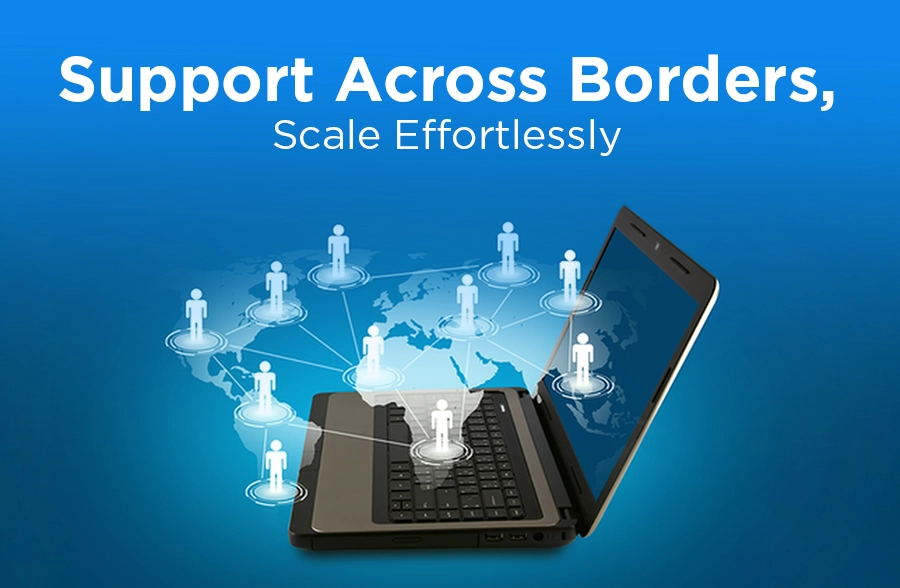Schedule a FREE call with our outsourcing expert now and get a precise quotation that meets your requirements. Don't wait - get started today!
Many businesses struggle to find skilled IT professionals who can provide fast and efficient helpdesk support. As technology evolves, the demand for help desk technical support jobs continues to grow. Yet, companies often face delays in resolving IT issues due to a shortage of qualified support staff. Over 50% of IT support requests depend on help desk professionals to keep operations running smoothly.
This gap in IT support creates a major challenge for businesses—but it also opens up great opportunities for job seekers. If you’re looking to start a tech career, a help desk technical support job could be your perfect entry point. It provides hands-on experience, career growth, and the chance to be the first line of defense against tech issues.
Mastering the Role of a Help Desk Technical Support Specialist
A help desk technical support specialist is the frontline hero in the digital landscape, bridging the gap between technology and its users. Far more than just problem-solvers, these specialists are adept at diagnosing and resolving a wide array of technical challenges, from minor glitches to complex system failures. They act as a vital lifeline, offering clear guidance, answering intricate questions, and ensuring seamless system functionality.
By maintaining the health of digital infrastructure, they empower businesses to operate efficiently, minimizing downtime and maximizing productivity. This role is not just about fixing issues—it’s about fostering trust, delivering solutions, and enabling organizations to thrive in a tech-driven world.
Career Progression Opportunities of a Help Desk Technical Support Specialist
Starting in help desk support is your entry point into a field filled with diverse opportunities. This role gives you hands-on experience with real-world IT challenges, teaching you how to think on your feet, communicate effectively, and solve problems efficiently. As you grow, you’ll find that your honed skills can open doors to more specialized and impactful roles. Here’s a closer look at where your career could take you:
1. Network Administrator
As a Network Administrator, you’ll take charge of an organization’s network infrastructure. This means setting up, maintaining, and securing the systems that keep data flowing smoothly. You’ll tackle issues like network outages, optimize performance, and ensure everything runs securely and efficiently. If you enjoy working with routers, firewalls, and servers, this role lets you dive deep into the technical side of IT.
2. Systems Analyst
Moving into a Systems Analyst role means shifting from fixing problems to preventing them. You’ll analyze how technology can better serve the business by improving existing systems or designing new ones. This role involves working closely with teams to understand their needs and creating solutions that make their work easier and more efficient. It’s a great fit if you like solving puzzles and thinking strategically about how technology can drive success.
3. IT Manager
Becoming an IT Manager could be your next step if you’re drawn to leadership. In this role, you’ll oversee the entire IT department, from managing teams to planning long-term tech strategies. You’ll ensure that technology aligns with the organization’s goals while also staying ahead of industry trends. This role is perfect for those who want to combine their technical knowledge with leadership skills to shape the future of their organization.
Where Will You Go?
The help desk is just the starting line. With each new challenge, you’ll gain the experience and confidence to move into roles that match your interests and strengths. Whether you’re drawn to the technical details of networking, the strategic thinking of systems analysis, or the big-picture vision of IT management, your career in IT is what you make of it. The skills you build early on will serve as your foundation, but the direction you take is entirely up to you.
What Does a Help Desk Technical Support Job Involve?
A help desk technical support role is a dynamic and multifaceted position that serves as the backbone of an organization’s IT operations. It’s not just about fixing problems—it’s about ensuring that technology works seamlessly so that businesses and users can focus on what they do best. Here’s a deeper dive into what the job entails:
A. Daily Responsibilities
The day-to-day tasks of a help desk technician revolve around solving problems and keeping systems running smoothly. This includes:
- Troubleshooting hardware and software issues,
- Assisting users with technical questions
- Maintaining IT infrastructure to prevent future problems.
You might reset passwords, install software, or guide someone through setting up their email. Every day brings new challenges, making the role both varied and engaging. The goal is to resolve issues quickly and efficiently, minimizing downtime and keeping operations on track.
B. Skills You Need
You’ll need a mix of technical expertise and soft skills to excel in this role.
- Problem-solving is at the core of the job, as you’ll often need to diagnose and fix issues with limited information.
- Strong communication skills are equally important, as you’ll be explaining technical concepts to non-technical users in a way they can understand.
- A solid foundation in technical knowledge—whether it’s understanding operating systems, networking basics, or software applications—is essential.
- Patience, adaptability, and a customer-focused mindset will also go a long way in helping you thrive.
C. Typical Work Environment
Help desk technicians work in various settings, depending on the organization. Some are based in office environments, where they provide in-person support to colleagues. Others work remotely, assisting users through phone, email, or chat. Larger organizations may have technicians stationed in call centers that handle a high volume of support requests. Regardless of the setting, the job often involves collaboration with other IT professionals and requires the ability to manage multiple tasks simultaneously.
D. Tools and Software Used
Help desk technicians rely on a range of tools and software to do their jobs effectively. Ticketing systems like Zendesk or ServiceNow are used to track and manage support requests, ensuring nothing falls through the cracks. Remote desktop tools such as TeamViewer or AnyDesk allow technicians to access and troubleshoot users’ devices from afar. Diagnostic software helps identify hardware or software issues, while knowledge bases and FAQs provide quick solutions to common problems. Familiarity with these tools, along with operating systems like Windows, macOS, and Linux, is essential.

Challenges in the Role – What to Expect
While working as a help desk technical support specialist can be fulfilling, it’s not without challenges. The role requires you to think quickly, adapt to changing situations, and stay calm under pressure. Here’s a closer look at some of the common challenges you might face:
1. Complex Technical Issues
One of the biggest challenges in this role is dealing with complex or unfamiliar technical issues. Not every problem will have a straightforward solution, and some may require research, trial and error, or collaboration with other IT professionals. You’ll need to be resourceful and persistent, using all the tools and knowledge at your disposal to find a fix. While this can sometimes be frustrating, it’s also an opportunity to learn and grow your skills.
2. Time Constraints
Help desk support often involves working under tight deadlines. Users rely on technology to do their jobs, and when something goes wrong, they need it fixed quickly. This means you’ll often have to prioritize tasks, manage your time effectively, and deliver solutions in a timely manner. Balancing speed with accuracy can be tricky, but it’s a skill you’ll develop over time.
3. Balancing Multiple Tasks
In a busy help desk environment, you’ll rarely focus on just one issue at a time. You might be handling multiple support tickets, answering phone calls, and assisting users in person—all at once. This requires strong organizational skills and the ability to switch gears quickly. Learning to prioritize tasks and stay focused is key to managing the workload without feeling overwhelmed.
4. Dealing with Frustrated Users
Not every user will be patient or understanding when they encounter a technical problem. Some may be frustrated, stressed, or even angry. Handling these situations professionally and calmly is a critical part of the job. You’ll need to listen carefully, show empathy, and reassure users that you’re working to resolve their issues. It’s not always easy, but it’s an important skill that can turn a negative experience into a positive one.
5. Staying Updated
Technology constantly evolves, and staying up-to-date with the latest trends, tools, and systems is a must. This means dedicating time to learning new skills, attending training sessions, or earning certifications. While it can feel like a lot to keep up with, it’s also what makes the role exciting and dynamic.
Is This Career Right for You? – What to Consider
If you’re thinking about a career in help desk technical support, it’s important to evaluate whether it aligns with your interests, strengths, and goals. Here’s what to consider when deciding if this is the right path for you:
1. Do You Enjoy Helping Others?
At its core, this role is about helping people. Whether you’re troubleshooting a computer issue or guiding someone through a software update, your work directly impacts others’ ability to do their jobs. If you enjoy solving problems and making a difference in people’s day-to-day lives, this could be a great fit.
2. Are You a Problem-Solver?
Help desk support is all about finding solutions. If you enjoy tackling puzzles, thinking critically, and figuring out how things work, you’ll likely find the role engaging. Every day brings new challenges, so you’ll need to be curious, resourceful, and willing to dig deep to find answers.
3. Do You Have a Passion for Technology?
A genuine interest in technology is essential for this role. You don’t need to be an expert but should be eager to learn and explore new tools, systems, and software. If you’re someone who enjoys tinkering with gadgets, troubleshooting devices, or staying up-to-date on tech trends, this career could be a natural fit.
4. Can You Handle Stress and Pressure?
The role can be fast-paced and demanding, especially when dealing with urgent issues or frustrated users. If you’re someone who stays calm under pressure and can manage stress effectively, you’ll be well-suited for the challenges of the job.
5. Are You Willing to Keep Learning?
Technology is always changing, and so are the skills required to support it. If you’re someone who enjoys continuous learning and is willing to invest time in developing your skills, this career offers plenty of opportunities for growth. Whether it’s earning certifications, learning new software, or staying updated on industry trends, a commitment to learning is key.
6. Do You Have Strong Communication Skills?
Clear and effective communication is a big part of the job. You’ll need to explain technical concepts in simple terms, listen carefully to users’ concerns, and provide instructions that are easy to follow. If you’re a good listener and can communicate clearly, you’ll excel in this role.
7. What Are Your Long-Term Goals?
Finally, think about where you want your career to go. Help desk support is often a stepping stone to more advanced IT roles, such as network administration, systems analysis, or IT management. If you’re looking for a career with room to grow and plenty of opportunities to specialize, this could be a great starting point.
By considering these factors, you can determine whether a career in help desk technical support aligns with your interests, skills, and goals. It’s a role that offers variety, challenges, and the chance to make a real impact—both for the users you support and the organizations you work for.
Keep Your Business Running with Expert IT Support
At Magellan Solutions, we provide reliable help desk technical support to keep your business operations running without disruptions. Our 24/7 IT support, remote troubleshooting, and technical assistance ensure that your team gets the help they need—when they need it. Whether you require network monitoring, software support, or hardware troubleshooting, our skilled IT professionals are ready to assist.
Let us handle your IT challenges so you can focus on growing your business. Contact Magellan Solutions today and keep your systems running smoothly!















